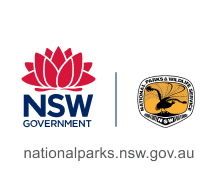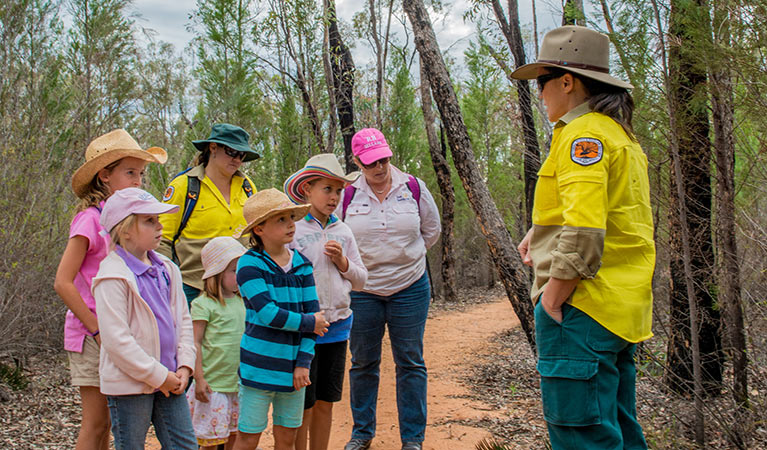Overview
Ranger talk at Kinchega is Stage 2 (Years 3-4) Geography excursion at Kinchega National Park. Meet a NSW National Park Ranger and learn about their job while exploring in the natural environment - or have a Ranger visit you in your classroom.
Read more about Ranger talk at Kinchega
For program outline, safety and practical information about this excursion, see info for teachers
| Stage | Stage 2 (Years 3-4) |
|---|---|
| Learning area | Geography |
| Student outcomes |
GE2-1. Examines features and characteristics of places and environments GE2-3. Examines differing perceptions about the management of places and environments GE2-4. Acquires and communicates geographical information using geographical tools for inquiry |
| Objectives |
Students will:
|
Excursion details
- Availability
- Subject to staff availability.
- Duration
- 3hrs
- Grading
- Easy
- Price
-
$5 per student for a half day tour.
- Accessibility
- Medium
- Booking
- If you would like to organise a NPWS school excursion please get in touch with local staff or use the 'Enquire' link for the online form.
Local alerts
For the latest updates on fires, closures and other alerts in this area, see https://www.nationalparks.nsw.gov.au/education/stage-2-hsie-ranger-talk-kinchega-national-park/local-alerts
Operated by
- School excursion inquiries - Broken Hill
- 08 8084 2880
- npws.westdarling@environment.nsw.gov.au
- 183 Argent Street, Broken Hill NSW
Park info
- in Kinchega National Park in the Outback NSW region
Kinchega National Park is always open but may have to close at times due to poor weather or fire danger.
-
Park entry fees:
$8 per vehicle per day. The park has a pay and display envelope payment system - please bring correct coins.
Buy annual pass.
Info for teachers
All the practical information you need to know about Ranger talk at Kinchega.
Program outline
- Students meet at campsite 20 on the Darling River (conditions permitting) for a short introduction to Kinchega National Park.
- Students then make themselves comfortable on the ground under the shade of the River Red Gums beside the Darling River.
- A ranger talks to students about their job and uses posters, fire uniforms and specimens to highlight the talk components.
- Students are encouraged to ask questions throughout and a dedicated question answer time can be included if students have prepared questions in class.
- The session can then be finished with a game (Aboriginal Sites, Barkindji Bush Foods, Tacks and Traces or Threatened Species) depending on the teachers needs and time availability.
This activity can also be held in your classroom.
Getting there and parking
On entering Kinchega National Park:
- Take Woolshed Drive
- The Kinchega Woolshed is 15km from the park entrance
Road quality
Check the weather before you set out as roads in Kinchega National Park can be closed in heavy rain.
- Unsealed roads
Vehicle access
- 2WD vehicles
Weather restrictions
- Dry weather only
Parking
Parking is available in hard-packed ground carparks at Kinchega Woolshed.
What to bring
Please wear fully enclosed shoes and bring a hat, sunscreen, wet weather gear, and lunch which should be low waste with a refillable water bottle. Students should bring gear in a backpack or similar (not plastic bags).
Maps and downloads
Risk assessment and risk benefits
Our rangers and guides have the technical skill and experience to assess the risks and the benefits of a variety of activities delivered as part of our learning programs.
We believe in including opportunities that allow students to learn and experience for themselves through exploration in the natural environment.
Please make your own risk assessment based on the information provided. Detailed potential risks and controls are provided for the site to assist teachers in risk management planning. Teachers and carers should be aware of, and consider the needs, abilities and medical conditions of students when visiting this site. The supervision of students remains the responsibility of the teacher. The school must ensure an adequate number of adult supervisors are present.
Accessibility
Disability access level - medium
Assistance may be required to access this area. Please let us know in advance if you are bringing someone with special needs so that we can plan accordingly.

